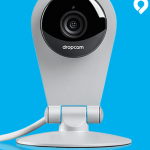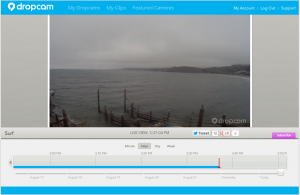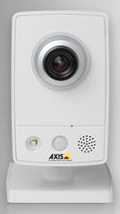 I have been using a Dropcam for about a year now and have been very impressed with it. It is a very low-cost WiFi IP camera that, instead of offering local viewing through a webserver on the device, automatically streams its video to Dropcam’s servers, where you can view the video from anywhere on the Internet.
I have been using a Dropcam for about a year now and have been very impressed with it. It is a very low-cost WiFi IP camera that, instead of offering local viewing through a webserver on the device, automatically streams its video to Dropcam’s servers, where you can view the video from anywhere on the Internet.
Just to review, the way a “normal” IP camera works is that it has a webserver on the device, and you access that webserver in order to view the video from the camera. For instance, if you connect the camera to your router, you’ll check the router to find its IP address – let’s say, for instance, that it’s 192.168.1.47.
You then use a web browser to view http://192.168.1.47, and your camera shows up there. However, if you want to view your camera from outside your network, you have to “port forward” a port to the web port on the camera. A number of factors can make that operation difficult.
The Dropcam does away with all of that, because the camera is only attached to your computer with a USB cable ONCE for configuration (it gets the WiFi configuration from your computer – mine uses the WiFi signal from my Remote Hub out in my workshop), then it joins your network and streams its video to dropcam.com. The camera and dropcam.com website have proven to be very reliable.
It is powered with a mini USB cable (5 volts), which is included, along with a wall plug USB power adapter.
Dropcam allows you to view the video from your camera for free on your dropcam.com account. If you want to record the video so you can go back and look at past video (e.g. for security purposes), they have inexpensive recording subscriptions.
 They have a number of demo cameras set up – including a nice one looking out a window onto Monterey Bay in California. While I couldn’t find a demo camera on a farm, this gives you a nice idea of how good the picture is and what the interface looks like – very good, very easy to use.
They have a number of demo cameras set up – including a nice one looking out a window onto Monterey Bay in California. While I couldn’t find a demo camera on a farm, this gives you a nice idea of how good the picture is and what the interface looks like – very good, very easy to use.
The Dropcam is very good, but it’s far from perfect. The big advantages are:
- Easy to set up and use
- Small, lightweight, inexpensive
- Transmits video AND audio – look and listen
- IOS and Android apps for viewing cameras
- Visible over the Internet, no port forwarding
However, it has a few very salient disadvantages:
- Not suitable for outdoor use – indoor use only
- No local access – you HAVE to be connected to the Internet to view the camera
- Fixed lens – no telephoto, no wide angle, no point/tilt/zoom
- A couple of seconds delay between the camera and the video stream
 If you have a place you want to keep an eye on, Dropcam is an excellent choice. The quality of the camera and picture is comparable to my “favorite” indoor camera, the Axis M1033-W. As you can see, although the camera has to be indoors, it does a nice job showing outdoor scenes if it can be placed inside a window.
If you have a place you want to keep an eye on, Dropcam is an excellent choice. The quality of the camera and picture is comparable to my “favorite” indoor camera, the Axis M1033-W. As you can see, although the camera has to be indoors, it does a nice job showing outdoor scenes if it can be placed inside a window.
Dropcam is, potentially, a very useful tool for your home and farm.

Pingback: IP Cameras on the Farm: Part 3 – Using IP cameras for security | Ayrstone Blog
Great!But we’re the best ip camera:)
This blog, like all others, collects hundreds of spam message per day. Most of them I just delete, but I decided to leave this one on here because, even though it’s spam, it’s on-topic. I have never used their cameras, so I can’t say whether they are any good or not. Caveat Emptor.
If you want to buy Oakley sunglasses, Uggs boots, or male enhancement (or any other) drugs, please let me know and I’ll forward all of them to you! 😉
-Bill
I have two Lorex indoor cameras mounted outdoors. They are under deep overhangs at the front door and patio/pool. They have been operating for over a year with no problems so far. The overhangs protect against rain/snow as well as trap some heat. Our location is in the Auburn CA area at 1600 feet elevation. We get hot weather in the summertime and snow and freezing in the winter.
If you are handy with tools, an inexpensive outdoor enclosure can be built. Just remember condensation is the killer. The enclosure will need a vent and heater or a vent to an inside space.
Best
Mike-
Very good points – indeed, several people have home-built weatherproof enclosures for their Dropcams – http://jamiemoney.com/blog/2013/7/11/weather-resistant-dropcam and http://www.ski-epic.com/2012_weatherproof_dropcam/index.html – you can, of course, do something similar for your Lorex (or my Axis) indoor cameras, but it doesn’t address the fact that these indoor cameras are not rated for cold or hot weather. In Auburn (we have a testing facility in San Jose, too) it’s not a huge issue, but in northern Minnesota and Wisconsin, it’s a lot more important.
We are definitely fans of Dropcam, but I have been waiting years for them to build an outdoor version.
Our original Hubs used “layer 3” meshing, so each Hub created its own IP subnet, making port forwarding to cameras impossible. Our new Hub2n uses “layer 2” meshing, so you can port forward to cameras attached to the new Hubs and view them over the Internet.
But I’m still looking for easy-to-use outdoor WiFi cameras. I’m not happy with what’s out there now.
Thanks for your note!
-Bill Moffitt
Checked out the demos. The quality is indeed on par with Axis. Hopefully, an outdoor version is in the works.
Please note that Dropcam have just introduced their new “Pro” product, but still no outdoor camera.